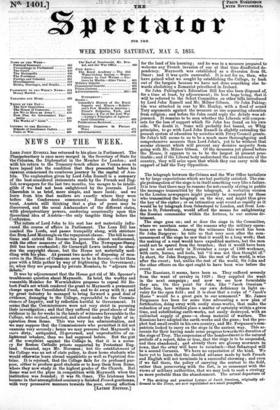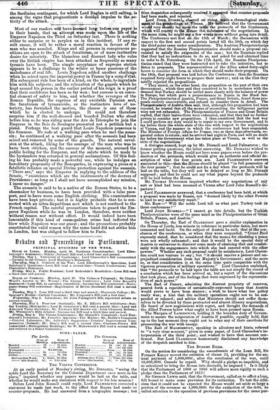The telegraph between the Crimea and the War Office tantalizes
us by large expectations which are but partially satisfied. The sim- ple prolongation of the siege is in itself something very like a failure. It is true that there may be reasons for not exactly stating in public the messages transmitted by the telegraph. A verbatim version in the London newspapers might possibly be compared by those who transmitted the telegraph on the way, and might thus give the key of the cipher ; or an intimation sent round BO rapidly as it would be by telegraph from Sebastopol to Loudon, and from Lon- don to St. Petersburg, would afford the means for enlightening the Russian commander within the fortress, to our serious de- triment.
The siege goes on; and so does the siege in the Committer, where we ascertain some of the reasons why the military opera- time are so tedious. Among the witnesses this week has been Sir John Burgoyne: he tolls us that very soon after the com- mencement of the siege he saw that it would be a long work ; that the making of a road would. have expedited matters, but the men could not be spared from the trenches ; that it would have been good to send out early in November a corps of 1500 workmen, with carts, horses, and tools, but "it was not then thought of." In short, Sir John Burgoyne, like the rest of the world, is wise after the event ; but, unlike the rest of the world, Sir John and the other officers on the spot ought to have been wise before the event.
The Russians, it seems, have been so. They suffered severely from the want of cavalry in 1829 ; they supplied the want in the next campaign ; and now we see how formidable they are. On this point Sir John, like "Jacob Omnium " before him, bore witness to our own deficiency in light ca- valry for the open field ; and it is clear that a corps of " Jacob's Horse" would be a great gain to our armament.' Mr. James Fergusson has been for some time advocating a new plan of fortification, doing away with costly stone-works, that make the reduction of any fortified place a matter of certainty within a given time, and substituting earth-works, not easily destroyed, with an unlimited supply of guns—a cheap material of warfare. The Russians have adopted the earth-works and the guns ; but the pro- phet had small credit in his own country, and Mr. Fergusson's com- patriots looked to carry on the siege in the ancient way. This ac- counts for their having made some progress towards the duration of the siege of Troy. The suspension of the bombardment is the nature/ prelude of a report, false or true, that the siege is to be suspended, and then abandoned ; and already there are gloomy murmurs in town, that tho army will have to reembark—that Sebastopol will be a second Corunna. We have no expectation of the kind. We have yet to learn that the decided advance made by both French and English will not terminate in a successful storming ; and even if we fail there, the policy of carrying the contest to the field, rather than persevering with the fort, is so consonant with the views of military authorities, that we may look to such a strategy as more probable than the abandonment. The actual departure of * The striking and practical Letters of Jacob Omniutn, originally ad- dressed to the Times, are now republished ass small pamphlet. the Sardinian contingent, for which Lord Raglan is still calling, is among the signs that prognosticate a decided impulse to the sac- tivity of the attack. .



































